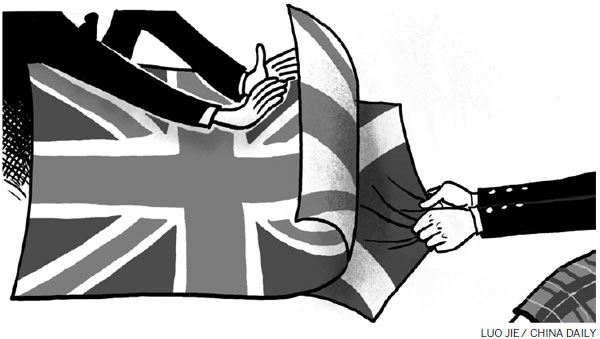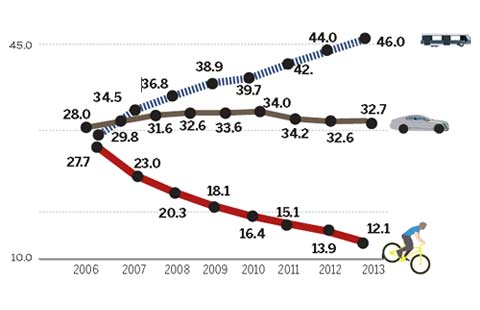Scotland: An inconvenient possibility
Updated: 2014-09-18 07:51
By Hannay Richards(China Daily)
|
|||||||||||
William Wallace, Robert the Bruce, David Cameron.
It's ironic but if there is a yes vote in the referendum in Scotland on Thursday, and it is once again ruled from Edinburgh rather than London, it will be in large part thanks to David Cameron, the incumbent prime minister of the United Kingdom. Not only did he have to give his government's consent for the referendum to go ahead, but he also ruled out the option of what is now being referred to as devo-max, the devolving of more powers to the Scottish parliament, and instead insisted on a straight yes or no choice to the question: Should Scotland be an independent country?
With the opinion polls at the time showing a healthy majority in favor of maintaining the Union, it was decided a straight yes/no independence referendum would result in vote in favor of keeping the union. However, that is looking a lot less like a sure bet now, with the polls showing the yes and no votes running neck and neck.
Just 10 days before the referendum, with the polls showing an upswing in people saying they intended to vote yes, the three main English parties struck a deal and pledged to give more powers to the Scottish parliament. But no details have been forthcoming of what this entails and no timetable presented. So it will probably not sway the minds of many still undecided voters.
If there is a yes vote, the Scottish government will have to set in motion the process for a written constitution, and there are hard negotiations that will need to be completed, not least on key issues such as a currency union, Scotland's share of the UK's national debt, and what will happen to the four submarines carrying missiles armed with Trident nuclear warheads that are stationed in Scotland, before the proposed independence date of March 24, 2016.
An independent Scotland will also have to negotiate for membership of NATO and the European Union. The rest of the UK, or rUK as it is known, would retain membership of NATO and the UN Security Council, as the government in London would retain control of Trident, but there would be growing pressure from those living in some cloud-cuckoo land of an imperial past for it to opt out of the EU.
Those claiming that Scotland is better off as part of the UK have been suggesting it is not a foregone conclusion that an independent Scotland will be able to join the EU. They have also tried to paint a dire picture of the future with the support of the oil companies and big banks, which have threatened to head south.
However, while independence does mean uncertainties, most of which can and will be resolved through negotiation, it also offers new opportunities. Despite the no camp's unproven portents of doom, there is a belief among many, not just in Scotland, but elsewhere in the UK, that too much power is centralized in Westminster, and it favors the wealthy at the expense of the poor. The wealth gap continues to widen and this is evident not just in Scotland, but also elsewhere in the UK.
With a growing number of people struggling to pay their bills, there is a perception that those supposed to safeguard their interests are too busy finding ways to pad their claims for expenses and voting for their own pay rises to listen to their concerns. It has been said only half in jest that it is London and the South East of England that should go independent, because they are far removed in mindset from the more community based values of the rest of UK.
The Better Together pro-unionists have tried to portray the yes voters as hearts-over-minds anti-English nationalists nursing historical hurts as well as present grievances. Yet to many in Scotland, not just Scots, but residents of other nationalities, including English, better together means people in Scotland working together for a fairer society, one that is not victim to the whims of the unchecked free-market pursuit of profit. The central question for many is which option, a business-as-usual more-of-the-same no vote or an uncertain-hopes-for-the-future yes vote, offers the best chance of creating a more caring and equitable society.
To overseas observers who say Scotland would become irrelevant if it votes for independence and the UK diminished in stature without Scotland, most of those who intend to vote yes might reply, that's just fine; Scotland is just a small country on the fringe of Europe that doesn't need or want to strut upon the world stage - something its leaders should bear in mind if the vote is yes.

The author is a writer with China Daily. hannayrichards@chinadaily.com.cn
Related Stories
Scotland highly split ahead of vote on independence 2014-09-18 06:56
Scottish FM insists using pound if Scotland votes for independence 2014-09-17 11:49
Independent Scotland will be a blow to UK 2014-09-17 07:50
Scotland referendum 2014-09-17 07:45
Today's Top News
How Alibaba IPO learnt from Facebook's mistake
Russia to beef up troops in Crimea
10 problems of Chinese society
PBOC injects $81b into banks
iPhone 6 spawns Chinese satire
US general 'not rule out' larger ground role in Iraq
China's door to open wider, Li says
Shanghai FTZ official removed
Hot Topics
Lunar probe , China growth forecasts, Emission rules get tougher, China seen through 'colored lens', International board,
Editor's Picks

|

|

|

|

|

|





